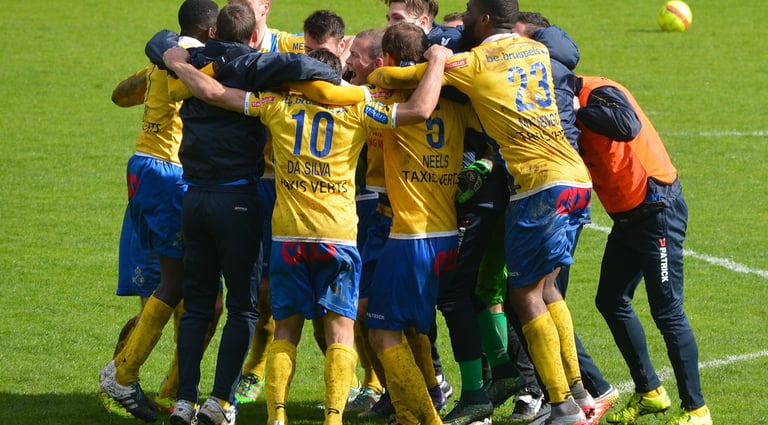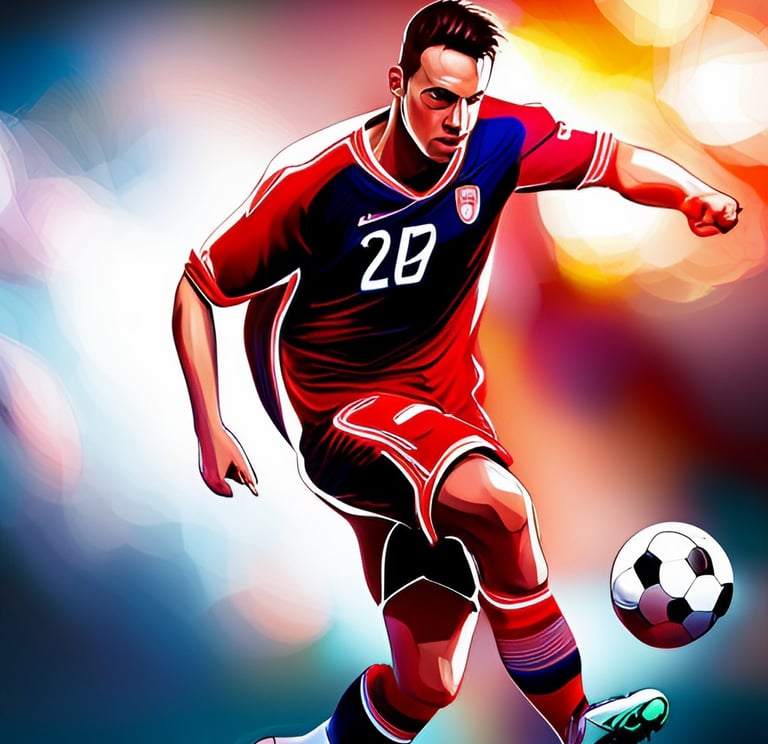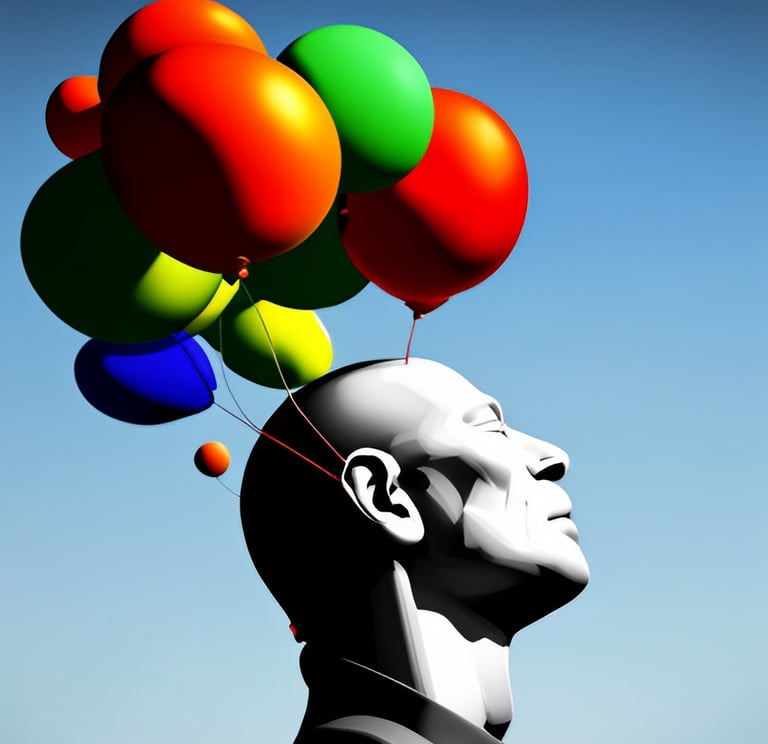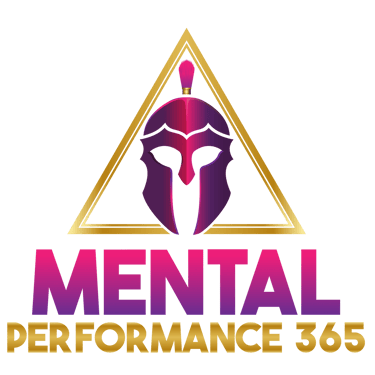
Mental performance for soccer players, creating your “GRIT”
SOCCER
Ignacio Segovia
7/5/202316 min read


Mental performance for soccer players, creating your “GRIT”
Before we jump in,
Why Mental performance for soccer players?
Let’s understand the 3 factors to achieve success in any area of life:
MEPER - PHYPER - TECPER
Success is a concept that has occupied the human mind since the dawn of civilization. For centuries, it has been the primary driver behind human advancement, innovation, and excellence. However, what does success mean? Where did the word originate, and how has it evolved over time to mean what it does today? This article will delve into the etymology of the term success and explore its many meanings throughout history.
The word success comes from the Latin word "successus," which means "a good result or outcome." The prefix "sub-" means "under," while the root "cedere" means "to go." Therefore, success originally meant "to go under," as in "to succeed in a task by passing under an obstacle." The word's modern meaning began to emerge in the 16th century when it started to be used to refer to the attainment of wealth or power.
Throughout history, different cultures have had varying interpretations of success. In ancient Greece, success was closely linked to athletics, art, and philosophy excellence. The Greeks believed that true success came from mastering one's craft and living a virtuous life. Similarly, in ancient China, success was associated with achieving balance and harmony in all aspects of life, including relationships, career, health, and spirituality.
In medieval Europe, success was often associated with military conquest and the accumulation of wealth and power. Knights and nobles were considered successful if they could win battles and acquire land and riches. During the Renaissance, success became linked to intellectual and artistic pursuits. The concept of the "Renaissance man" emerged, with individuals like Leonardo da Vinci and Michelangelo achieving success by mastering multiple disciplines.
In modern society, success is often equated with financial wealth, professional achievement, and social status. The rise of capitalism and the emphasis on individualism has led to a culture that values productivity and outcomes above all else. Success is often measured by the amount of money one earns, the number of awards or accolades one receives, or the level of influence and power one has.
Nevertheless, success encompasses diverse interpretations based on individual perspectives. For the purpose of this discussion, we will adhere to its etymological definition as a favorable result or outcome. In my forthcoming article on "Result-Oriented Goal Setting," I will delve deeper into this definition. In essence, success equates to accomplishing the goals we set for ourselves. And to achieve this, three crucial factors come into play: MEPER - PHYPER - TECPER
MEPER
Success Triangle
PHYPER
TECPER
In this triangle, as a Mental Performance Coach, my main focus is on supporting you in the "MEPER" realm. While I can provide some guidance in the other two areas, they are not my area of expertise. It would benefit you to seek out a Physical Performance Coach and a Technical Performance Coach to accelerate your progress in all three domains further. (The Success Triangle is a concept adapted from the manual Gold Medal Mental Toughness Guide by Joni Neidigh).
Screening
Screening is a critical component of mental performance coaching in athletics as it helps identify an athlete's current level of performance and allows coaches to tailor training programs to meet their specific needs. In the context of soccer, screening can help coaches identify areas of improvement in an athlete's mental performance that may be inhibiting their ability to perform optimally on the field.
The screening process at the beginning of mental performance coaching should include various assessments that measure an athlete's cognitive abilities, such as attention, memory, problem-solving, decision-making, and creativity. This screening process aims to establish a baseline for an athlete's mental performance and identify areas where they may need additional support or training.
For example, a standard screening tool used in soccer is the Attentional and Interpersonal Style (TAIS) inventory, which measures an athlete's attention skills and interpersonal attributes. Another tool is the Sports Inventory for Pain (SIP), which assesses an athlete's susceptibility to injuries.
The SEGOVIA program utilizes the following screening tools in its screening section:
Coaches Questionnaire
Parents Questionnaire
Mental Toughness Assessment (by Dr. Larry Neidigh)
Perceived Daily Reflection Sheet
Perceived Mental Log Keeping
In your case, the Perceived Mental Log Keeping will not be just a perception. You will be an expert on this because it is the first letter of the “GRIT” process I will teach you in this article. The “G” is Get Mental Log Keeping.
Empowerment
Empowering an athlete's burning desire for soccer is a powerful tool to improve their mental performance on the field. Hypnosis is one of the techniques used in this process to help athletes tap into their subconscious mind and align their thoughts, feelings, and actions towards their goals.
Empowering an athlete's burning desire through hypnosis removes any mental barriers or beliefs that may be inhibiting an athlete's optimal performance. It can help them visualize themselves performing at their best, increase their confidence and motivation, and enhance their mental toughness.
In the context of soccer, empowering an athlete's burning desire for the sport can have numerous benefits. For example, it can help them set clear goals for themselves, establish a positive mindset, and develop a winning attitude. It can also help them overcome any fears or doubts they may have about their abilities and focus on their strengths and areas of improvement.
I save these techniques for my one-on-one client consultations or group hypnosis sessions. It's not because I don't want to share them—I'd love to—but let me be honest, they're quite complex to explain in articles like this. If you're curious, you can book a free strategy session with me, and we can dive deeper into it.
Goals
Setting goals is a crucial component of mental performance coaching for soccer players. Goals give athletes a clear direction, focus their efforts, and help them stay motivated. The SMART model of goal setting is a practical approach to developing specific, measurable, achievable, relevant, and time-bound goals.
Setting SMART goals involves identifying specific, measurable goals that are relevant to an athlete's performance and time-bound. For example, instead of setting a vague goal like "improving mental toughness," a SMART goal would be "increasing my focus and concentration during games by practicing mindfulness meditation for 10 minutes every day for the next 30 days."
In the context of soccer, mental performance goals can include improving focus and attention, increasing confidence, visualizing success, managing stress, and developing a positive mindset. For example, a soccer player may set a goal to improve their passing accuracy by 10% during the season or to practice visualization techniques before each game to enhance their confidence on the field.
Measuring the effectiveness of goal setting in mental performance coaching for soccer players involves tracking progress, reviewing goals, and making necessary adjustments throughout the process. Coaches can use various methods to track progress, such as recording statistics, conducting assessments, and providing feedback. Reviewing goals regularly helps athletes stay focused and motivated while making necessary adjustments to their training program.
To maintain motivation and stay focused on their goals, soccer players can use several strategies, including visualizing success, creating accountability partners, and celebrating milestones along the way.
The SEGOVIA program utilizes the following goal-setting tools in its goal section:
Result-Oriented Goal Setting
The SMART statement.
Goal-oriented power words.
DAILY MENTAL TRAINING SUCCESS HANDOUT.
Pre-Competition routine.
In-Competition routine.
Post-Competition routine.
Mental Checklist for Competition.
In this section, you also will have an advantage. The second letter for the “GRIT” is “R”; Result-Oriented Goal Setting. I will give you more details about this in future articles.
Optimize
The human brain is the most intricate and fabulous computer available to humanity. It has the capability of conducting complicated tasks and has an unlimited capacity for learning. However, due to various factors such as upbringing, cultural influences, and past experiences, we may get exposed to limiting beliefs and negative thought patterns that can sabotage our potential.
My services provide individuals with customized hypnosis sessions that address their specific needs, helping them to replace limiting beliefs with positive and empowering ones that pave the way for success. Using various hypnosis techniques with direct suggestions, my sessions are designed to help clients reach their goals by tapping into the power of their subconscious mind.
The goal of each hypnosis session is to help clients relax and enter a state of heightened focus, allowing them to visualize success and receive positive suggestions that reframe limiting beliefs. For example, if someone believes that they cannot succeed in a particular area, I would use direct suggestions to help them achieve their goals.
Each client will receive a customized hypnosis program that addresses their specific needs and objectives. The program includes a series of sessions tailored to their individual goals, timelines, and progress. I also provide clients with tools and resources they can use in between sessions to reinforce their positive beliefs.
Here is the third letter to build your “GRIT” power, the “I”; Internal Dialogue for Self-Encouragement (Affirmations).
Vision
Some people claim that visualizing is difficult for them and that they cannot utilize visualization techniques. Let's try a simple exercise to demonstrate. Close your eyes and picture the door of your house. Can you see its color, the intricate details, and how it opens - whether it's a push or pull? Consider the design where the handle is positioned - left or right. You can answer all of these questions because you know the door of your house. You can envision it in your mind like a movie or simply describe it with words in your thoughts. This is the essence of visualization.
The power of your visualization depends on the level of concentration and focus you can achieve, which in turn is influenced by your state of mind. By incorporating the "T" step of GRIT, I can teach you how to enhance your visualization process through the use of imagination. While it's possible to explore these techniques on your own through mindfulness, meditation, and self-hypnosis, working with a hypnotist can help you achieve a deeper level of visualization. A hypnotist can guide you into a state of deep relaxation and help you access the REM state more efficiently, which can lead to even more powerful visualizations. Throughout these articles, I will share tips and techniques for enhancing your visualization skills, so stay tuned!
Inventory
My services go beyond simple tips and tricks to improve mental performance. Throughout the process, I provide my clients with access to more than 20 unique techniques that are tailored to their specific needs and goals.
During the inventory phase, we work together to identify the best tools for each individual client. From there, we customize these techniques to be easily integrated into their daily routine and used to enhance their mental performance before any competition.
These techniques cover many areas, including attitude, focus, and the ability to handle pressure. Clients will learn how to manage their thoughts and emotions in high-stress situations, stay focused and engaged throughout a competition, and develop a positive and resilient mindset to help them achieve their goals.
Some of the techniques we cover include visualization exercises, mindfulness meditation, self-talk strategies, and breathing techniques. Each technique is carefully selected based on the specific needs and goals of the client and is designed to help them reach their full potential both on and off the field.
By providing personalized and effective mental training techniques, my clients are able to unlock their full potential and achieve success both inside and outside of the competition.
Achievement
At the onset of our program, we conduct a thorough assessment of each client to gauge their current state. Midway through, we administer another set of measures to track progress and make any necessary adjustments. By the end of the program, we provide clients with a comprehensive report showcasing their achievements and growth.
We also encourage clients to set their own goals throughout the program. During this phase, we work collaboratively with clients to develop concrete strategies for achieving those goals. Our approach empowers clients to reach new heights by unlocking their full potential and creating new pathways to success.
Through our program, clients gain an expanded perspective and explore new horizons. We help fuel creativity and innovation, enabling clients to break through mental barriers and embrace new challenges confidently and enthusiastically. With our guidance, clients are equipped with the tools they need to continue achieving great things long after the program concludes.
With the foundational understanding of "GRIT" in our seven-step program "Segovia," it's time to explore each letter in detail so that you can apply these principles to your own personal progress.
“GRIT”
Grit is a personality trait that refers to a person's ability to persevere and maintain their passion and motivation for long-term goals despite facing obstacles, challenges, or failures. It involves displaying determination, resilience, courage, and tenacity in the face of adversity.
Get Mental Log Keeping
Result-Oriented Goal Setting (Goals)
Internal Dialogue for Self-Encouragement (Affirmations)
Thought-Based Simulation or Imagining (Visualizations)
"Mental Log Keeping" or "G" refers to the practice of developing self-awareness and tracking progress toward personal goals. Keeping a mental log allows you to identify patterns in your thinking and behavior and make adjustments for continuous growth.
"Result-Oriented Goal Setting" or "R" emphasizes the importance of setting measurable, achievable goals and tracking progress toward them. This helps ensure that your efforts align with your desired outcomes and motivates you to keep pushing forward.
"Internal Dialogue for Self-Encouragement" or "I" involves using affirmations and positive self-talk to cultivate a more positive mindset and build confidence in your abilities. You can build resilience and self-efficacy by shifting negative self-talk to encouraging and supportive inner dialogue.
"Thought-Based Simulation or Imagining" or "T" involves using visualization techniques to create mental images of desired outcomes. This helps improve focus, reduce anxiety, and boost confidence by creating a vivid mental picture of success.
This article is getting a bit lengthy, so let's wrap it up today with a topic called "Get Mental Log Keeping". We'll dive into the next set of "GRIT" letters in the next article.
How to Develop GRIT: Tips on the acronym for Building Mental Performance
“The sculpture is already complete within the marble block, before I start my work. It is already there, I just have to chisel away the superfluous material.”
-Michelangelo
“But I know! I don't believe, I don't feel, I don't think, I know!. I know we know everything. How is that possible? We know everything. The catch is whether we want to acknowledge it or not. If you want to quit smoking, do you know what you need to do to quit smoking? Of course. If you want to lose weight, do you know what you need to do to lose weight? Absolutely. Do you know what you need to do if you want to get along better with your partner? Yes, you do. You know what you need to do to have a better relationship. You know. You just don't want to. Or you don't feel like it. Or you don't find the energy to... Or you're simply unwilling. There's a difference between trying and doing. When you try, you don't want to do it. You want to do it when you actually do it. You know perfectly well that the only thing you need to do to get along with your dad, your mom, your friend, with the world, and to love the world is to love yourself. You know it, but you don't want to. You'd rather eat donuts than exercise. Is it true? Yes, it is. We know it all, my friend. We've always known it all, but it is often simpler to shift blame onto others while still desiring to receive a paycheck.”
-Ignacio Segovia
Here, I'll show you how to organize what you already know. Think of it as unlocking your potential, just like Michelangelo discovering the masterpiece within a rock. It's interesting how people pay for things they already know, isn't it? We often hire others to process raw materials and sell us the final product, like a fancy water bottle. But hey, the choice is yours – drink from the tap or splurge on fancy alkaline water at the supermarket.
You can do it on your own, or you can join me in the SEGOVIA program. No matter what, you can kick off your GRIT journey today. And guess what? It's gonna be exciting! 😄
Let's delve into the essential details of the "SEGOVIA" program, along with a concise version called "GRIT" that I'll share in this group of articles. Our "Mental Performance Success in 7 Steps with Segovia" program is designed to be straightforward, impactful, and effortless to implement. Allow me to outline these seven steps for you:
Screening
Empowerment
Goals
Optimize
Vision
Inventory
Achievement
Next Article Soon ->
Get Mental Log Keeping
Based on my experience with numerous athletes, I discovered that the sequence of the 7 steps yielded better results when we initiated our work with the screening stage. Specifically, we utilized the "Mental Toughness Assessment" to establish a baseline and the "Mental Log" to help the client form a distinct vision of their starting point in the journey. This approach proved to be highly effective in maximizing outcomes.
The Mental Log discussed in this article is an exercise that evolves into a mental training diary/journal after several sessions. The athlete maintains this log following significant workouts or competitions, serving as a valuable tool for reflection and progress tracking.
During this initial stage, the objective is for athletes to meticulously record their thoughts and experiences throughout the event or competition.
Ever wondered what thoughts were swirling in your brain? The mental log has it all - the good, the bad, and the ugly! It's everything you tell yourself that either boosts you up or holds you back. Each performance is recorded within 24 hours after the competition while it's fresh in your mind. Let's dive into the fascinating world of your thoughts and reflections!
The purpose of this log is to assist in analyzing your thinking patterns, strengths, and weaknesses. Through this log, you can develop self-awareness of the mental and emotional beliefs and reactions that influence your performance in the game. By putting your thoughts onto paper, you can identify the inner dialogue during competition-induced stress. This practice allows you to recognize when you are feeling empowered, in control, and performing at your best while also shedding light on instances where you may feel powerless, self-defeating, and lacking control.
For example, you're a soccer player. What's going through your head? Are you nervous or excited?
As the game begins, how do you feel? Are you relaxed or hesitant when receiving the ball? Are you confident in your passing and shooting skills when you have possession? Are you focused on the game or distracted by what others may think of your performance?
Take note of these thoughts in your "mental log" within 24 hours after the game. Be honest and clear, including both positive and negative thoughts. You might have thought, "Oh no, that defender is taller than me; it's going to be a challenge!" or "Alright, I'm faster than this opponent, let's use my speed to our advantage!"
I recommend keeping this log for three to four weeks during training and competitions to identify patterns in your thinking processes. As a coach, we use these logs to help set meaningful goals for the short, medium, or long term. Remember, mental preparation is just as crucial as physical training in achieving success on the field. Players can reach their full potential and excel in the game with proper preparation and mindset.
Download our Mental Log Keeping from our Facebook group files.


Technical Performance (TECPER)
Technical performance in soccer refers to an athlete's ability to execute the technical skills required for the sport efficiently and effectively. It includes various skills such as ball control, passing accuracy, dribbling, shooting, and tackling. Technical performance can be influenced by several factors, including training, practice, and game experience.
In the context of athletics, mainly soccer, technical performance plays a crucial role in an athlete's ability to perform optimally on the field. Soccer requires high levels of technical proficiency, making it critical to measure and improve technical performance.
One way to measure technical performance in soccer is through match statistics, which evaluate an athlete's success rate in executing technical skills such as passes, shots, and tackles. Another method of measuring technical performance is through observational analysis, which evaluates an athlete's technique and execution of skills during training or practice sessions.
Physical Performance (PHYPER)
Physical performance is the ability of an athlete to perform athletic movements and tasks with optimal efficiency and effectiveness. It includes various physical abilities such as strength, speed, endurance, flexibility, and agility. Several factors, including nutrition, sleep, training, and recovery, can influence physical performance.
In the context of athletics, mainly soccer, physical performance plays a crucial role in an athlete's ability to perform optimally on the field. Soccer requires high levels of endurance, speed, agility, and strength, making it necessary to measure and improve physical performance.
One way to measure physical performance in soccer is through field tests, which evaluate an athlete's speed, agility, and endurance. For example, the 40-yard dash test measures acceleration and speed, while the shuttle run test measures agility and quickness. Another method of measuring physical performance is through strength tests, which evaluate an athlete's maximum strength or power output, such as the bench press or vertical jump tests.


Mental Performance (MEPER)
Mental performance refers to an individual's capacity to perform cognitive tasks efficiently and effectively. It encompasses a range of mental abilities, including decision-making, problem-solving, attention, memory, and creativity. My program emphasizes three key ability groups: Attitude, Focus, and the ability to handle Pressure. Other several factors, including nutrition, sleep, stress, and physical health, can influence mental performance.
In the context of athletics, mainly soccer, mental performance plays a crucial role in an athlete's ability to perform optimally on the field. Soccer requires high levels of attention, quick decision-making, and good spatial awareness. Therefore, measuring and improving mental performance is necessary for athletes to excel in their sport.
One way to measure mental performance in soccer is through reaction time tests. These tests measure an athlete's ability to react quickly to visual or auditory stimuli, which is a crucial skill in soccer. Another method of measuring mental performance is through cognitive assessments, which evaluate an athlete's ability to process information, make decisions, and solve problems quickly. Another one is the “Mental Toughness Assessment” I use in my program's “Screening” phase. You can do a free "Mental Toughness Assessment" in our facebook group. Please be aware I process the results twice a month. Therefore, you will receive your results in one or two weeks.


And, What is MEPER - PHYPER - TECPER???
Once you become aware of your thought patterns, working on boosting your mental toughness in the game becomes more accessible. Your mental log can be valuable for venting any anger, frustration, or negativity resulting from subpar performance. Use it as a starting point to shift your attitude and let go of self-doubt, paving the way for a more positive and confident mindset. You take your first step toward excellence by embracing competition as a learning experience.
As we wrap up this blog post, we hope that you have gained valuable insights on the importance of Mental Log Keeping in the GRIT framework.
In our upcoming posts, we'll continue to explore the remaining steps in our GRIT acronym, including Result-Oriented Goal Setting (Goals), Internal Dialogue for Self-Encouragement (Affirmations), and Thought-Based Simulation or Imagining (Visualizations).
By developing these essential skills and strategies, you can cultivate the perseverance and passion needed to achieve your long-term goals despite facing challenges, obstacles, or failures.
So, stay tuned for more practical advice and tips on applying GRIT principles in your daily life and unlocking your full potential. Together, let's work towards achieving greatness!
Special Acknowledgements:
I would like to give special thanks to the amazing individuals who have made it possible to share this content and all the valuable tools on the SEGOVIA program with you. Their hard work in developing mental performance techniques for many athletes has been truly inspiring, and I'm grateful for the opportunity to follow in their footsteps. I humbly acknowledge that I am standing on the shoulders of giants, such as Joni Neidigh and her Gold Medal Mental Toughness program, Caryn Bird and her Attitude of a Champion Course, and Kay Porter & Judy Foster, authors of the book Visual Athletics: Visualization for Peak Sports Performance, and Dr. Larry Neidigh author of the Mental Toughness Assessment, many of the forms you will be using, and composer of the great melodies I use on my hypnosis sessions.
While I will mention these incredible sources from time to time in my articles, I want to emphasize that this blog is not an academic endeavor. It's simply a platform to share valuable information with you. Therefore, I will not fill this blocks with bibliographic references. However, it's important to recognize the sources of all the knowledge I'm sharing with you. Thank you!
